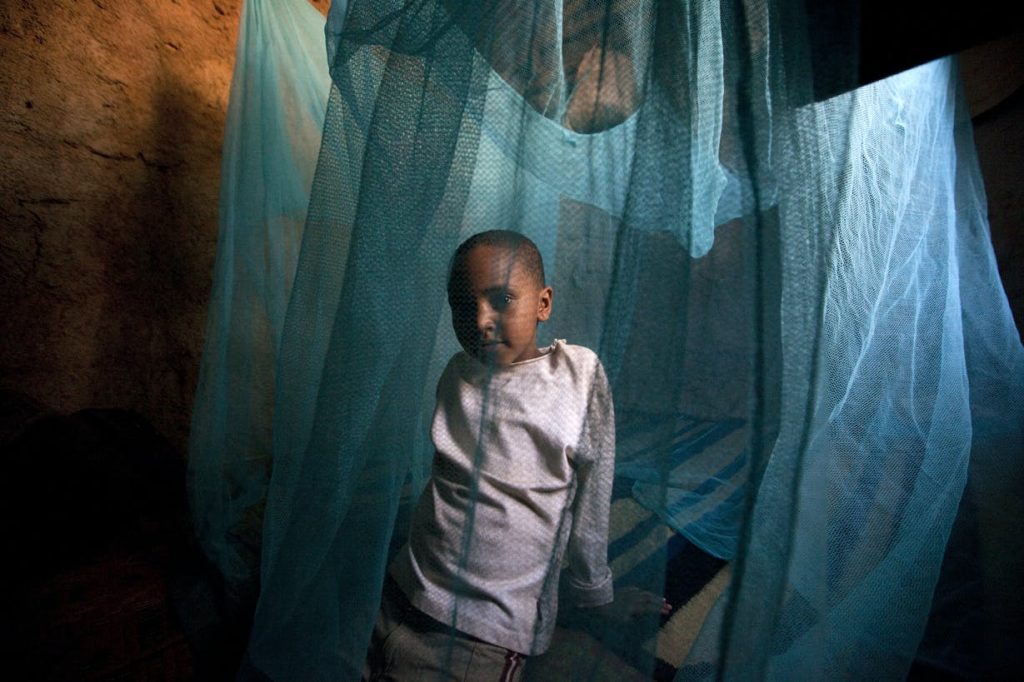Bill Gates says it’s one of the best investments he’s ever made. It’s helped save millions of lives and turn the tide against three deadly diseases. What is it?
It’s the Global Fund to Fight AIDS, Tuberculosis and Malaria (Global Fund). And 2019 is an important year for governments and other donors to support its work.
On January 11, President Emmanuel Macron of France announced the launch of the sixth replenishment for the Global Fund, a partnership that raises funds and invests them in local and country-level programs to fight these three diseases.
The announcement, made in partnership with World Health Organization Director-General Dr. Tedros Adhanom Ghebreysus and Executive Director of the Global Fund Peter Sands, calls for countries to honor their commitment to achieving Sustainable Development Goal 3 (SDG 3), “health and well-being for all” by collectively pledging at least US$14 billion to fight AIDS, tuberculosis (TB), and malaria.
Since 2002, more than 27 million lives have been saved in countries where the Global Fund invests. However, these gains are fragile and need to be protected. As the Global Fund explained in their investment case:
“We must step up the fight, by increasing resource commitments and innovation, by scaling up prevention and treatment. If we don’t, we will go backwards. As we have repeatedly witnessed, any complacency or weakening of resolve lets HIV, TB, and malaria resurge at alarming rates.”
We are at an important moment in history in the fight against these three diseases. Without critical funding for prevention, testing, and treatment of the three diseases, we will quickly see infection rates rise and death tolls climb. We can continue our investments in order to protect and build on the advances being made, or watch our progress erode, letting the hope of ending the three epidemics and of achieving SDG 3 slip away.
Big Asks with Big Results
A US$14 billion price tag is undoubtedly a lot of money. But if countries fully fund the ask, a robust replenishment would mean:
- 16 million lives saved between 2021-2023, reducing the mortality rate by 52% across AIDS, TB, and malaria by 2023
- HIV, TB, and malaria deaths decline to 1.3 million, a reduction of nearly 3 million people (compared to rates in 2005)
- 234 million infections or cases averted, a 42% reduction across the three diseases (relative to 2017 levels)
Additional benefits of continued investments in the Global Fund include:
- For every US$1 invested, a US$19 return on investment in health gains and economic returns
- Nearly US$46 billion spurred in domestic financing from individual countries
Getting to Universal Health Coverage and our Health Goals
In addition to these huge gains and returns on investment, a full replenishment of at least US$14 billion will lay the groundwork to achieve universal health coverage, a key cornerstone of SDG 3 and good health for everyone, everywhere. As the largest multilateral investor in health systems, the Global Fund’s success is closely tied to people being able to access quality health services without suffering financial hardship – and to achieving health and well-being for all.
The need for, and impact of, a fully-funded Global Fund is clear. But it will take all of us working together over the next few months to ensure that pledges are actually made.
As part of these efforts, the UN Foundation will be participating in two upcoming events in February that will help shape the replenishment this year. The first is the Global Fund’s pre-replenishment meeting in New Delhi, India where India will be able to showcase the incredible improvements in public health programs that are possible with cooperative action through the Global Fund.
Additionally, a diverse set of partners will share their views on how to achieve the global goals through increased investment, innovation, and a focus on results at the African Leadership Meeting: Investing in Health. This meeting will bring together African heads of state to increase financing by countries for health, as well as promote greater collaboration between global health institutions, such as the Global Fund, during a period of multiple international global health replenishment efforts. The meeting also hopes to spur private sector commitments and to foster commitments to creating innovative finance and health systems solutions to improve the health of Africans.
The deadline to achieve the SDGs is fast approaching, and we know we have a long way to go to reach our goals. A successful Global Fund replenishment will be critical to ensuring we are on the right path to meet these goals – a promise we all must keep to ourselves and future generations.

